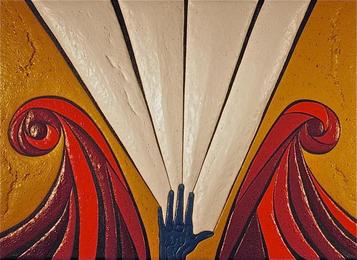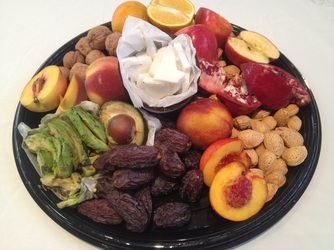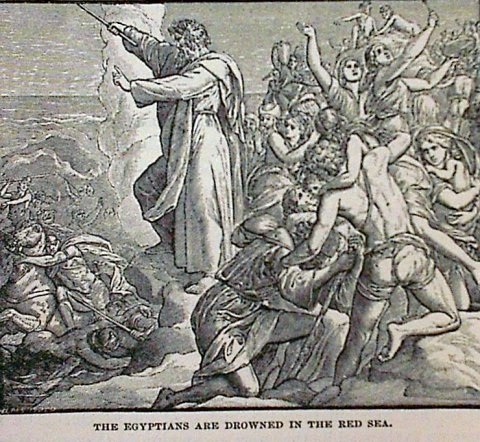 "You Parting Your Red Sea" by Michael Black (Click for Link).
"You Parting Your Red Sea" by Michael Black (Click for Link). Sometimes, one person’s moment of deliverance can prove to be another person’s tragedy. Disaster for one person becomes a miracle for another. How is it that one person can deserve to be saved at the expense of another person?
This is a question that the rabbis saw in the story of the parting of the Red Sea, which we read about in this week’s Torah portion (Beshalach). The Israelites, who had thought they were sure goners, saw the waters of the Red Sea part and they marched to freedom on dry ground, while the entire Egyptian army was engulfed by the sea and drowned. The Israelites sang the Torah’s most famous song in celebration, but there was no singing in Egypt.
You may know that there is a famous midrash on this story in which God silences the angels in heaven from joining the Israelites in song. God asks the heavenly hosts, “How can you sing My praises while My creatures are drowning?” Disaster and miracle are in the eye of the beholder. God cries for the Egyptians, and we learn from this to regard the full reality of every situation, not just how it benefits us.
In Jewish tradition, we remember that there is suffering in every joy, and there are moments of redemption even in great loss. You, no doubt, know about the custom of removing some wine from the second cup of the Passover seder in order to remember how the Egyptians suffered during the Ten Plagues. You may not know that we also diminish our joy on the seventh day of Passover — the day that marks the anniversary of the parting of the Red Sea — by reciting only the short form of the Hallel psalms of thanksgiving. We want to notice, as God noticed, that our freedom was won at the expense of Egypt’s great loss.
The Zohar, the most important work of the Jewish mystical tradition, has its own story about the parting of the Red Sea and the death of the Egyptians. In the Zohar, there is a moment in which the angel who represented Egypt in the heavenly court stood before God and said, “How can You choose to let one nation of sinners die to save another nation of sinners? How can you pick winners and losers among two people who both have broken faith with You?” The Zohar says that letting the Egyptians die was an excruciating decision for God.
The Zohar looks at one puzzling phrase in the Torah for a clue of God’s painful dilemma. While the Israelites were trapped between the Egyptian army and the sea, God said to Moses, "Mah titzak elai; debeir el B'nei Yisrael v'yisa'u," “Why do you cry out to Me? Tell the Israelites to advance!” Jewish tradition has long puzzled over the verse. Why does God tell the Israelites to stop crying out when they have not been crying? Why does God tell them to advance when the sea has not yet parted?
The Zohar interprets the verse by saying that God was telling the Israelites, “Don’t think I’m going to save you just because of your pleas. If you want to be saved, prove yourself worthy of being saved by advancing — that is — by performing mitzvot!” God wanted the Israelites to prove themselves more worthy than the Egyptians by actually living up to the standards expected of them.
When the Israelites found themselves in dire straights, they were tempted to think that God might save them merely because of the covenant God had formed with their ancestors. The covenant goes a long way, surely, but can it justify the choice to save Israel by destroying another nation? God says, figuratively, “You’ve got to give Me a better reason than that to save you. Show me that you really understand what it means to be in a relationship with God by being godly.”
“Mah titzak elai”, “Why are you crying out to Me?” God says. Why aren’t you doing what is right and acting out of your highest values? That — in the end — is what will save you. "v'yisa'u!" Advance! Do the right thing!
I am not going to compare the situation of Judaism in North America today with the situation of the Israelites huddled on the shores of the Red Sea with Pharaoh’s army fast approaching. Our situation is not really quite that bad. But I am sure that you are familiar with the dire warnings about the future of the Jewish people in this hemisphere that have been issued by the Pew Study and by others. Some will say that we are stuck in a place where we are hedged between an army before us and a sea behind us.
The army before us might be the demographic reality of Jewish zero-population growth. A low birth rate and a high rate of intermarriage means that the Jewish people are shrinking relative to almost every other demographic group in the world.
We might also believe that the sea behind us is a metaphor for the loss of support for Jewish institutions among today’s Generation Xers and Millennials. Younger Jews do not feel the same impulse to support synagogues the way their parents’ and grandparents’ generations felt compelled to do their part by joining synagogues and donating to Jewish causes.
It does not seem like a stretch to say that we are in a moment in Jewish history when we feel threatened. We wonder if synagogues will last to the end of this century. And we know that, when facing a desperate situation, we tend not to think as clearly as we usually do. We put our survival ahead of everything else and don’t stop to consider the consequences of our actions. It’s time for us to make sure that we are thinking straight, and that we are acting out of our highest values.
Torah teaches us that kvetching doesn’t help. Crying out to God won’t save us. The same can be said for other forms of expecting a miracle. No unforeseen deep-pockets donor is going to come along to save us from our challenging demographic realities. No new program is going to be the magic bullet that suddenly gets young Jews to fill the seats of the synagogue and start supporting it the way their grandparents did.
There are a lot of great ideas in the Jewish community today. In my fourteen years as a congregational rabbi, I have been truly impressed by innovative programs and policies designed to re-engage Jews and especially to get young Jewish families to come to the synagogue.
There have been successful efforts to leverage future Jewish giving by teaching the value of philanthropy to b’nei mitzvah students. I have seen programs like SynaPlex that try to reinvent Friday nights at the synagogue by turning the temple into a multifaceted place for families to sing, learn and play together to greet Shabbat. I have seen Listening Campaigns that get congregations involved in social action by getting members to talk to each other about the things that concern them most deeply and personally.
These are all good ideas. These are all ways that can help reenergize Jewish communities. But they are not enough. The real way to attract Jews to the synagogue, to create energy around building a Jewish community, is simply to do what God asked the Israelites to do as they stood on the shores of the Red Sea: Stop your crying and just do what is right and act out of your highest values. That simple reminder is worth more than all the best-practice suggestions that you can learn by scanning the URJ website or reading the latest book on how synagogues tick.
I believe that the synagogues that will survive and thrive in the 21st century are the ones that ask: “What do we stand for?” and “What is the right thing to do?”
Let me tell you about the behaviors I see in the synagogues that are asking these questions:
1) They engage enthusiastically and whole-heartedly in social action. When congregations really look at the problems faced by real people in their communities and decide to do something that really will make a difference, they create an energy that is irresistible. There is nothing like the passion that goes along with truly helping people in need that makes Jews feel like their synagogue matters. I have seen people who were utterly lukewarm about supporting the synagogue until they had the experience of joining with other Jews to help to feed people who were hungry. It transforms the way people think about Jewish community. Instead of seeing the synagogue as a place to pay dues in order to get their kids “bar mitzvahed,” they start to see the synagogue as a place that challenges them to live up to their highest values.
2) The synagogues that will survive and thrive in the 21st century are the ones that stand for real and meaningful worship that moves people to joy. This cannot just be a gimmick, like handing out instruments on Friday night, and it is not just changing the music to a style more appealing to young people. When congregations stop thinking about their services as the ceremony to get through before the oneg, and start thinking of worship as a time for making deep connections to other people and taking the time to feel God’s presence in their lives, amazing things can happen. When a member of the congregation takes a moment to share memories of a loved-one before reciting the kaddish, the service is transformed into a moment of holiness for everyone. When congregants are invited to sing together with passion and energy, they lose themselves and join the experience of being part of something larger than themselves. That is the kind of service that people will look forward to attending every week.
And, 3) The synagogues that will survive and thrive in the 21st century are the ones that engage people in deep Jewish learning that helps them reflect on the issues in their lives. By being the place where people come to learn in a way that helps them discover what their life is all about, the synagogue becomes the indispensable spiritual home for people of all ages. A synagogue that helps people discover what “doing the right thing” means for them is a synagogue that will never lack fervent supporters.
We are living in uncertain times for Judaism and —even more so — for Jewish institutions. If we want to cross the sea through these times, we need to reconnect with the values and the behaviors that are at the heart of Torah and of our tradition. We need to show God and ourselves that we mean to do more than just survive. We wish to thrive by doing mitzvot — doing what’s right and living up to our own highest values.
Other Posts on This Topic:
Beshalach: The Red Sea and Your Marriage
Missing Pieces



 RSS Feed
RSS Feed
